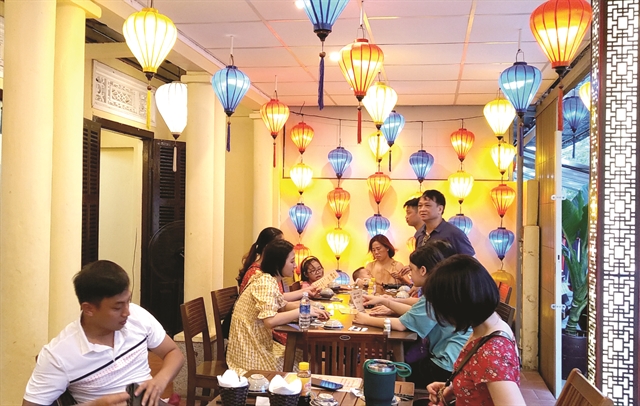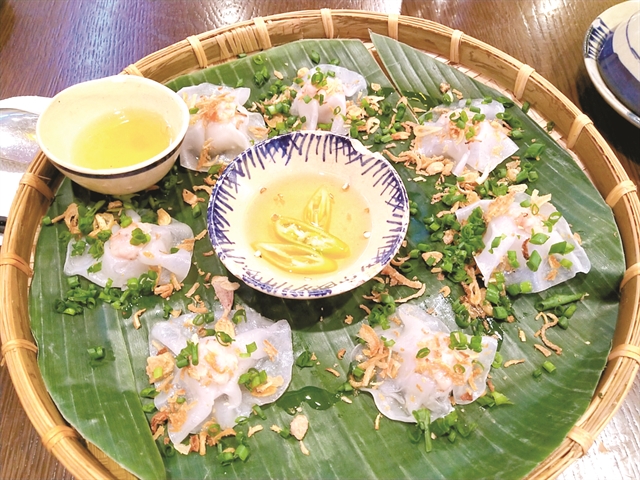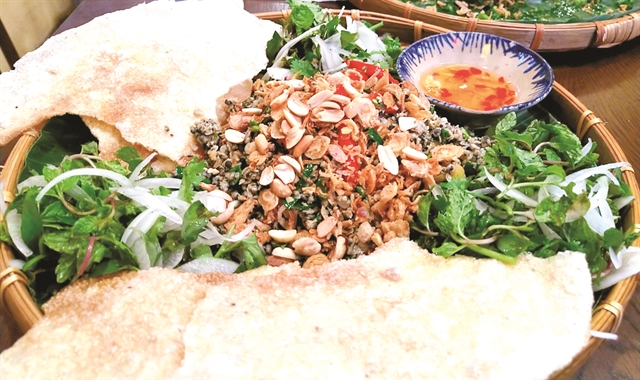 Restaurant Review
Restaurant Review

Góc Việt Restaurant in Hội An boasts beautiful décor and unique local cuisine. Minh Thu heartily recommends a visit.

|
| LIT UP: The restaurant is well-furnished with colourful lanterns - a typical handicraft of Hội An - all around. VNS Photo Minh Thu |
Sitting right next to the night market in Hội An’s Old Quarter, Góc Việt Restaurant can be readily found by any visitor looking to discover food and night life in the ancient town.
After arriving in Hội An, in central Quảng Nam Province, in the late afternoon, I decided on Góc Việt (which means “Vietnamese corner”) after seeing numerous recommendations on TripAdvisor and websites on what to do in the ancient town.
I planned to have dinner and then stroll over to the pedestrian mall in the Old Quarter. Góc Việt has an ideal location by an area where tourists tend to flock.
The menu is full of local specialities visitors simply must try, such as Hội An chicken rice, cao lầu (Hội An rice noodle soup), and White Rose - a nice dumpling romantically named long ago by the French.
I started out with cao lầu, a noodle soup with a curious name meaning “high level”. A bowl includes fresh rice noodles, slices of barbecued pork, bean sprouts, lettuce, and aromatic herbs, which are then topped with crispy fried pigskin and dried noodles and finished with a spoonful of broth. You, dear diner, mix it all up before enjoying.
Local people say the name originated when Hội An first became an international trade port of some renown. There were many foreign merchants in the town, who chose to have lunch or dinner upstairs at a restaurant so they could have a view over the goings-on down below. Another supposition is that it was considered a delicacy and eaten by rich gourmands while sitting on a raised floor.
The cao lầu served at Góc Việt is definitely cooked in the traditional way, with a harmony of ingredients. The dish can also be found in neighbouring Huế and Đà Nẵng, and even in HCM City and Hà Nội, but gourmets know these are not authentic. For the water used in making cao lầu noodle must be taken from Bá Lễ well and local water sources, while herbs from Trà Quế Village, not far from Hội An, are also more fragrant than those grown elsewhere.

|
| CLASSIC FARE: White Rose, a signature dish from Hội An. VNS Photo Minh Thu |
A must-try appetiser while in town is hến xúc bánh đa (stir-fried baby clams with sesame rice crackers) -- an authentic dish of the central region and also a great accompaniment to beer.
It’s also popular in Huế, with baby clams caught from Clam Dune, and in north-central Hà Tĩnh Province, with baby clams from the La River.
In Hội An, the main ingredient originates from Cẩm Nam Island, which sits in the Thu Bồn River near the coast. The clams found here are small compared to those from other regions but are more savoury.
Joining the baby clams as the highlight of this amazing dish is crispy bánh đa (Vietnamese sesame rice crackers). The dish is a mixture of stir-fried clams with a handful of dried onion and garlic cloves, lemongrass, ginger, chilli pepper, and flagrant knotweed. Diners use a piece of crispy rice cracker as a "spoon", scooping up the mixture then taking a mouthful.

|
| CRUNCH: 'Hến xúc bánh đa' (stir-fried baby clams with sesame rice crackers), prepared and cooked in the central style. VNS Photo Minh Thu |
Visitors to Hội An must also try White Rose while in town. I had never actually heard of it until the waitress recommended it as a local speciality worth trying. The romantic name was given it by French merchants centuries ago, and while it’s known locally as bánh vạc I believe White Rose is the more common name.
The little dumplings are made from translucent white dough filled with spiced minced shrimp or pork, and bunched up to look like little white roses. The edge of the dumplings certainly resembles flower petals.
Some shrimp or pork are also placed on top of the carefully-folded noodles and topped with crispy shallots. The unique dipping sauce is a mix of shrimp broth, hot chilli, lime juice, and sugar.
My dinner at Góc Việt Restaurant was absolutely delicious and the staff warm and welcoming. Their recommendations were helpful for a tourist like me, and they explained all of the dishes and how best to eat them in an authentically Vietnamese way.
Prices are reasonable compared to all the restaurants just a few steps away along the river, at Bridge Pagoda, or in the heart of the Old Quarter. VNS




